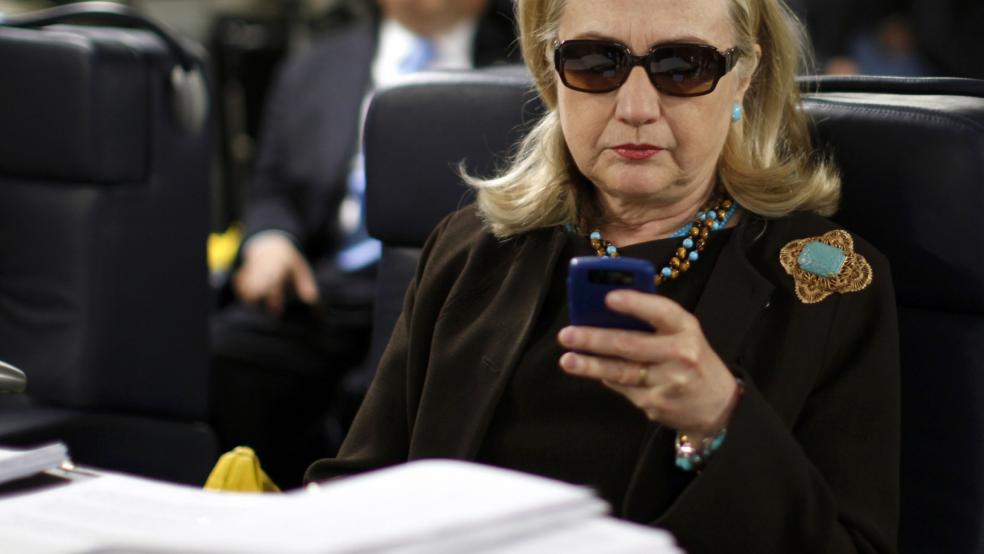A new survey of three key battleground states offers some troubling news for former Secretary of State Hillary Rodham Clinton: While most voters give her high marks as a strong leader, about half question her honesty and trustworthiness.
The Quinnipiac University poll of likely voters in Florida, Ohio and Pennsylvania suggest that the recent flap over revelations that Clinton used her personal email to conduct public business at the State Department – presumably to maintain greater control over her messages – has hurt her standing with voters.
Related: How the GOP Budget Could Help Hillary in 2016
Majorities in all three states think Clinton still has serious questions to answer about her handling of her email, while voters are roughly evenly divided over whether congressional hearings are warranted to get to the bottom of the case.
“On the plus side, Secretary Clinton is considered a strong leader – a key characteristic for voters when picking a president, more so than her leading, but lesser-known, potential GOP opponents,” Peter A. Brown, assistant director of the poll, said in a statement. “But about half the voters in all three states question her honesty and trustworthiness.”
Clinton revealed in a press conference at the United Nations March 10 that she had deleted about half her emails from her years as secretary of state, saying she had turned over to the administration all correspondence about government business while erasing personal communications. She acknowledged that it would have been wiser to use a government email for official business, but insisted she had fully complied with every rule and was going “above and beyond” what was required of her.
Related: Can Hillary Survive Two New Scandals Before She Runs for President?
A select House committee investigating the 2012 attacks against a U.S. diplomatic outpost in Benghazi, Libya that killed four Americans including the U.S. ambassador subpoenaed the server that housed Clinton’s email in search of evidence of Clinton’s conduct throughout that tragic episode.
However, Clinton’s lawyer, David Kendall, informed the committee last week that an examination of the server showed that there are no remaining copies of any emails she sent during her time in office. House GOP leaders are dissatisfied with that response. And the controversy over Clinton’s handling of her email apparently hasn’t gone down well with many voters, either.
Asked whether they think the former first lady and U.S. senator is honest and trustworthy, Florida voters surveyed by Quinnipiac replied no, 50 percent to 41 percent, Pennsylvania voters said no, 49 percent to 44 percent, Ohioans said yes, 47 percent to 46 percent.
Related: Cruz Is First to Declare for 2016 Presidential Run
More than half of those interviewed said that serious questions remain about her use of emails while heading the State Department from 2009 to 2013. And they are evenly divided over whether there should be a congressional investigation.
One finding that should give Clinton and her backers some pause: well more than a third of those interviewed in all three states said the email controversy would make them less likely to vote for her in the 2016 presidential campaign.
This negative mindset might help to explain Clinton’s relatively mediocre showing in hypothetical matchups with prominent Republican presidential aspirants. While she is the prohibitive favorite to clinch the Democratic presidential nomination next year, the general election campaign is likely to be far rockier for her.
The closest contests are in Florida, where former Gov. Jeb Bush leads Clinton, 45 percent to 42 percent, and in Pennsylvania, where Sen. Rand Paul (R-KY) gets 45 percent to Clinton’s 44 percent. Only in Ohio does she hold a lead, 46 percent to 41 percent, over Rand Paul.
Related: GOP 2016: Scott Walker Has the Lead, Jeb Bush Has the Money
Quinnipiac’s analysis notes that the gender gap remains wide open as Clinton leads among women in every contest, by margins of seven percentage points to 28 percentage points. Her margins among men range from a 3 percentage point lead to a 23-point deficit.
The poll was conducted March 17 to 28, with samples of slightly more than 1,000 voters in each of the three states and a margin of error of plus or minus three percent.
Top Reads from The Fiscal Times





